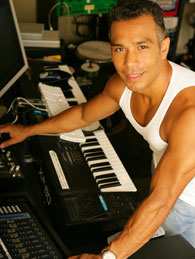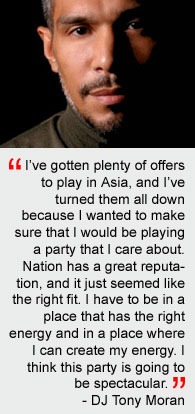Many people can claim success, even fame, as a disc jockey. And a handful of others tout their abilities as remixers, dropping some of the biggest and lesser names in the pop industry as their muses. But the true rarity in the industry is the man or woman who can say that he is a bona fide producer, that he has stood in the sound booth with the likes of Cher, Bruce Springsteen or Luther Vandross, helping them along as they make tape after tape of vocals for their next big album.

It's no wonder, then, that this week, he was exhausted — in a four-day span he travelled for gigs in New York, New Orleans, Atlanta and Mykonos, Greece!
Moran isn't one to let travelling get him down, though — in fact, he relishes it. And, he says that one of the most anticipated moments of his career is coming right up with his appearance at Fridae's Nation.VI in October, his first gig in Asia.
"You know, I've gotten plenty of offers to play in Asia, and I've turned them all down because I wanted to make sure that I would be playing a party that I care about," Moran told Fridae.
"Nation has a great reputation, and it just seemed like the right fit. I have to be in a place that has the right energy and in a place where I can create my energy. I think this party is going to be spectacular."
To be sure, Moran is at the top of his game, spending hour after hour either travelling, behind the decks or in the studio, but we tracked him down to talk about things both old and new.
æ: Tony, a while ago when we spoke, you were a little under the weather because of discomfort from an old wound — what was that all about?
Tony: It's a recurring problem. I'm actually one of those ghetto kids who got stabbed. Yeah, I was assaulted as a kid. I was in college and went to a local McDonalds with my girlfriend. There was a lot of gang activity in my neighbourhood. And, even though I'm a little guy, I didn't take shit from anybody!
æ: Did you provoke the altercation?
Tony: Well, they said something to me, and I said something to them, and I was pounced by five guys. It's an experience I wouldn't give up even though I got my ass kicked and I got stabbed. I survived, and it was one of those wake-up calls that led me to really think about who I want to be in my life and what I want to become. Every once in a while some of that scar kicks in. But I'm still kicking, I'm making my records, and I'm DJing. And I'm thankful for that.
æ: You're known for your comebacks. In fact, you stopped spinning for a number of years before making a huge comeback a few years ago. What happened?
Tony: You know, I started out as a DJ when I was 18 or 19 years old. Then, I was always really motivated and had my own radio show in New York City playing more hip hop, and another dance show on KTU, the dance station here. It wasn't long before I was going out a lot and hanging out with other DJs in the studios. I told them I had a lot of ideas and they encouraged me to bring them to the table.
æ: They took notice in short order, no?
Tony: At 21, I had my first single, "Show Me" by the Covergirls and it sold one million copies. From there, I started working with the Fat Boys, and they sold three million records. I was still DJing, but, by the time I was 24, I had sold four million records. That's when I told myself that I had to make a choice. I felt like I couldn't multi-task so much, and I knew that I wasn't completely developing a craft. I felt like I was talented, but I also felt like I was lucky to be involved in the projects. I had a lot to learn. Fortunately, I was surrounded by a group of really secure musicians; I was doing remixes with Arthur Baker and Shep Pettibone, Nile Rodgers, Jelly Bean Benitiez and all the people from that era. I was really educated by the best musicians in the world — I was working with Hall and Oates in the studio, Springsteen, Mick Jagger —I decided that I had to stop DJing to be able to devote my time to modifying this craft and get better at it. I was always spinning at home and having people over, but nothing with too much pressure.

Tony: I had produced about 30 cuts on different albums around the world, but none of them had anything to do with the beats and rhythm that I loved. I was becoming a little disenchanted wondering if I was being creative for the sake of being creative, or being creative from the path of formula, and that's a really weird and funky place to be in. That's when I said if I can't feel this in my gut and in my soul, maybe I should just call it a day and know that I had done something that I was really proud of.
æ: You were essentially ready to retire?
Tony: Yeah. But, that's when a friend asked me to go play in Chicago... he was a good friend, so I said yes and went to play Crobar. All of a sudden it was like someone put a shot of creative adrenalin in my system. Two weeks later I was writing "You're So Beautiful" with Donna Summer and "Give it Up" with Kevin Aviance and a whole bunch of records that just changed me. I was driven by the turntables and the CDs and the crowds and making new sounds, and I couldn't wait for the weekend to come for me to present them to people and to see their reaction. It was so different from writing something for Cher and then not having it come out for months. Just so different. It changed me and consumed me a bit.
æ: Word on the street is that you just bought a new house with your boyfriend and built a new studio from scratch. What are your thoughts on the changing technology for producers and jocks?
Tony: I went from vinyl to CDs kicking and screaming. Playing vinyl with your fingers against the turntable is like a hand in another hand. You're not really thinking about the technical, it just happens. I couldn't do CDs because it was like playing a video game. When they started making the Pioneers and the Denons, it began to feel more like playing records, though. Plus, when I go to DJ, I don't bring like five hours of music, I have to bring five days of music. The one weekend that made a difference for me was when I did Miami on Wednesday, Tel Aviv on Friday and San Francisco on Saturday. I had a couple hundred records in different tubs, like 70 pounds of carry-on. I thought I was gonna need a spinal replacement. Since then, a lot of computer programs have been developed that modify the more clinical and digital sound you get out of a CD and really warms it up. Once you get it right, it's a lot better and a lot easier to make a nice sound.
æ: That should come in handy for your Nation gig. I hear you're really excited about it.
Tony: Absolutely. And, instead of T-shirts, people should bring towels 'cause it's gonna be hot.
æ: You've got some tricks up your sleeve?
Tony: Of course. When I get to any exotic city, I feel that people are so pumped up I just want to deliver something completely unique. I want people to know that this is a very special gig for me, and I really want the music I play to be an imprint of my personality. I actually have a lot of special mixes that I've been holding back so that I can debut them at Nation.
æ: What are you working on now?
Tony: My album, The Event. It's a compilation, but there are a lot of tracks on it that I either wrote or produced. It should be out by the end of September, I'm just finalising some of the tracks now.
æ: People tend to give you a lot of leeway to be creative with their stuff. You've done well for yourself, made a lot of money - what's a day like in the personal life of Tony Moran?
Tony: Well, sometimes I think I want to take a vacation. My boyfriend and I have a real relationship, we have dinner, watch Desperate Housewives and CSI. But, we're both very passionate about what we do. We've been together seven years, and, as much as I love doing all the stuff I'm doing, I love the person I'm with. We do the best that we can and we care about each other and have learned that neither is perfect, and that has made things so much easier... it's much easier to relax!
The three-day Nation event will also see Argentina-born LA-based De León play at the Military Ball party on Oct 20, DJ Sawa (Japan) at the Muscle Beach party; DJ Severino (Italy) at the Pirates Paradise pool party and hot faves DJs David S (Taiwan), Victor Cheng (Taiwan) and Kate Monroe (Australia) - who played at Nation last year - at the closing party on Oct 22. Log onto www.fridae.asia/nation for regular updates, DJ bios, and links to purchasing party tickets, Jetstar tickets to Phuket (ex-Singapore) and making hotel reservations at host hotel Hilton Phuket Arcadia and/or other supporting hotels.

